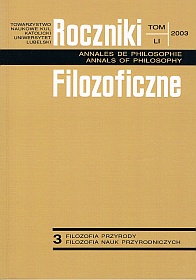Czy naturalizm jest prawomocny?
Abstrakt
Naturalism that I deal with is an approach towards the world, the man and the possibilities and methods of learning about the world. It maintains that there is an existential continuity of reality and this is a continuity of nature and not of other spheres of existence.
A view formulated in this way silently accepts the assumptions of ontological realism and epistemological realism. Hence it becomes part of the ontological paradigm of philosophy. After Kant, that is after mentalistic (transcendentalistic) paradigm in philosophy came into being, the legitimacy of the ontological way of philosophising cannot be maintained. Is then naturalism – that at present experiences another revival – only a misunderstanding? Well, no. The limits of its validity – but not legitimacy – are set by science. Within its area it is obvious and useful, perhaps even indispensable. It is a type of unrealised research attitude by whose virtue a scientist treats the object of his studies as autonomously existing and one that can be objectively cognised. However, here he is supported not by theoretical arguments, but first of all by pragmatic and psychological-social ones.
Bibliografia
Baumgartner H. M.: O konieczności dualnego postrzegania świata. W: tenże. Rozum skończony. Ku rozumieniu filozofii przez samą siebie. Tł. A. M. Kaniowski. Warszawa: Oficyna Naukowa 1996 s.264-286.
Herbut J.: Naturalizm. W: Leksykon filozofii klasycznej. Red. J. Herbut. Lublin: TN KUL s. 379n.
Lorenz K.: Kants Lehre vom Apriorischen im Lichte gegenwärtiger Biologie. „Blätter für deutsche Philosophie” 1941 Nr. 15 s.94-125.
Lorenz K.: Die Rückseite des Spiegels. Versuch einer Naturgeschichte menschlichen Erkennens. München: Piper 1973 (wyd. pol. Odwrotna strona zwierciadła. Próba historii naturalnej ludzkiego poznania. Tł. K. Wolicki. Warszawa: PIW 1977).
Kant I.: Krytyka czystego rozumu. T. 1-2. Tł. R. Ingarden. Warszawa: PWN 1957.
Kant I.: Prolegomena do wszelkiej przyszłej metafizyki, która będzie mogła wystąpić jako nauka. Tł.B. Bornstein. Oprac. J. Suchorzewska. Warszawa: PWN 1960.
Kłoskowska A.: Socjologia kultury. Warszawa: PWN 1981.
Kołakowski L.: Epistemologiczny sens etiologii wiedzy. W: tenże. Czy diabeł może być zbawiony i 27 innych kazań. Londyn: Aneks 1984 s.35-45.
Martens E., Schnädelbach H.: O aktualnej sytuacji filozofii. W: Filozofia. Podstawowe pytania. Tł. K. Krzemieniowa. Red. E. Martens, H. Schnädelbach. Warszawa: „Wiedza Powszechna” 1995 s.33-56.
Pałubicka A.: Naturalizm i antynaturalizm. W: Filozofia a nauka. Zarys encyklopedyczny. Red. Z. Cackowski. Wrocław: PAN 1987 s.403-412.
Pobojewska A.: Biologia i poznanie. Biologiczne „a priori” człowieka a realizm teoriopoznawczy. Łódź: Wydawnictwo UŁ 1996.
Pobojewska A.: Jedna natura – wiele kultur, jedna kultura – wiele natur. W: Między sensem a genami. Red. B. Tuchańska. Warszawa: PWN 1992 s.178-181.
Pobojewska A.: Naturalizm − antynaturalizm – kulturalizm. „Człowiek i Światopogląd” 1989 nr 2 s.28-42.
Siemek M. J.: O przedmiocie filozofii. W: tenże. Filozofia, dialektyka, rzeczywistość. Warszawa: PIW 1982 s.7-22.
Siemek M. J.: Transcendentalizm jako stanowisko epistemologiczne. Tamże s.58-75.
Vollmer G.: Evolutionäre Erkenntnistheorie. Angeborene Erkenntnisstrukturen im Kontext von Biologie, Psychologie, Linguistik, Philosophie und Wissenschaftstheorie. Stuttgart: S.Hirzel Verlag 1975.
Wuketits F.: Herbert Spencer, Charles Darwin, Konrad Lorenz: historische Perspektiven zur evolutionären Erkenntnistheorie. W: Erkenntnis- und Wissenschaftstheorie. Hrsg. von P. Weingartner, J. Czermak. Wien: Hölder-Pichler-Tempsky 1983.
Copyright (c) 2003 Roczniki Filozoficzne

Utwór dostępny jest na licencji Creative Commons Uznanie autorstwa – Użycie niekomercyjne – Bez utworów zależnych 4.0 Międzynarodowe.





